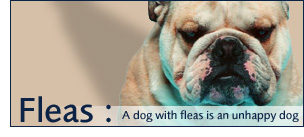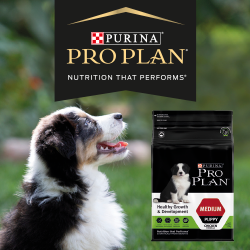Caring For Your Dog - Fleas
 The
Dreaded Flea!
The
Dreaded Flea!
With the return of warmer weather, fleas appear out of hibernation and start to cause problems. Fleas are responsible for the majority of cases of skin problems. Most dogs that are bitten by fleas will have some itching, but some pets develop a severe allergic skin condition called flea allergy dermatitis. Controlling the flea population will go a long way in helping your dog remain healthy and happy.
What is a flea?
Adult fleas are small, brown and wingless,
a little larger than the size of a pinhead. They move fast and can
leap great distances. They are the leading cause of skin problems
in dogs. Fleas can occur year-round in warm climates or on pets
that live indoors. Adult female fleas survive by feeding on blood.
The preferred host for this meal is your dog, but fleas will readily
bite humans. Heavy flea infestations can even cause anemia and death.
Fleas carry tapeworms. Your pet can get tapeworm infections from
biting infected fleas, so worming is an essential part of your dogs
care.
How can you tell if your dog has fleas?
You can tell your dog has fleas if you find
the adult fleas or the flea dirt on the skin. These can be seen
most easily on the rear and belly. Flea dirt is actually flea feces.
It looks black, but will appear red brown dabbed with water on a
piece of white paper. To find out, place your dog over a piece of
white paper and rub it briskly. The flea dirt will fall on the paper.
How do you get rid of fleas?
To get rid of fleas from your dog you must
treat both the dog and the environment. For every one flea you see
there are 99 unseen eggs and developing fleas that live in your
rugs, furniture, the pet's bedding, or outside. To control fleas,
you must control this population of developing fleas as well as
the adults. The best products currently available from your veterinarian
include flea shampoos, dips, sprays, powders and flea combos to
control the adult fleas on your pets, and newer products that can
be used on your dogs and cats monthly to control both adult and
immature fleas. Be sure to treat all the animals in your household.
If you have a heavy infestation, you may need to treat your house
and yard with products specifically designed for use on rugs, furniture,
pet bedding or lawns. Your veterinarian can tell you which products
will be safest and most effective for your situation. In cases of
heavy infestation a professional pest exterminator may be helpful.







